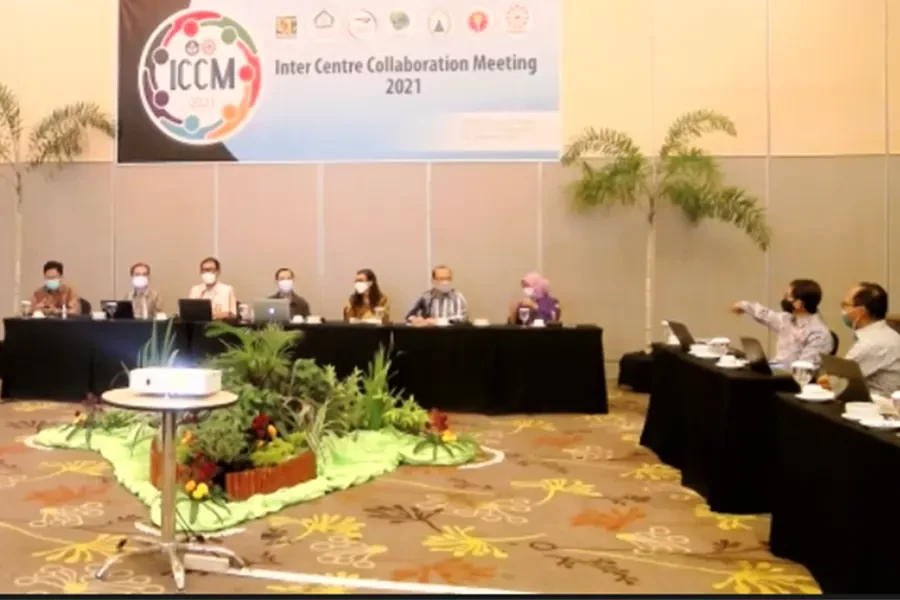Inter-Center Collaboration Meeting of the 7 SEAMEO Centers in Indonesia
The 7 SEAMEO Centers in Indonesia (SCI) organized a blended Inter-Center Collaboration Meeting on 2 - 4 September 2021. The meeting aimed to discuss and reach an agreement on programs of the Centers, to support the programs of the Ministry of Education, Culture, Research, and Technology of the Republic of Indonesia.
The opening remarks was delivered by Mr Anang Ristanto, the Head of the Bureau of Cooperation and Public Relations, representing the Secretary-General of the Ministry of Education, Culture, Research, and Technology of the Republic of Indonesia. In his opening remarks, Mr Anang shared the expectations of the Secretary-General on SEAMEO Centers in Indonesia to support the programs of the Ministry. “In this event, I would like to share the directions from the Honorable Secretary General in regards to the contributions from SEAMEO Centers in Indonesia to the programs of the Ministry of Education, Culture, Research, and Technology of the Republic of Indonesia,” stated Mr Anang.
There are 5 episodes of the Merdeka Belajar Program of the Ministry that can be supported by the SEAMEO Centers in Indonesia, namely:
1. Episode # 2: Kampus Merdeka
In this episode, the SEAMEO Centers can support the Merdeka Belajar Program with various researches or best practices of various educational fields, with collaboration with member countries of SEAMEO in realizing the Kampus Merdeka Program.
2. Episode # 5: Teachers as Facilitators
SEAMEO Centers can provide support in student-centered learning methods in which teachers have roles as facilitators in holistically and proactively developing the students’ characters to become Pancasila students.
3. Episode # 7: Schools as Facilitators
It is expected that SEAMEO Centers can be a catalyst to realize the Indonesian education reformation vision which focused on the development of holistic learning through the six profiles of Pancasila students.
4. Episode # 8: Vocational Schools as the Center of Excellence
SEAMEO Centers to provide support in developing Vocational Schools in producing graduates who have soft and technical skills with strong characters.
5. Episode # 11: Free Vocational Campus
It is expected that SEAMEO Centers can contribute to enriching vocational education units to produce skillful graduates.
Mr Anang also shared the concept of synergizing efforts that can be developed between the SEAMEO Centers in Indonesia and the Bureau of Cooperation and Public Relations of the Ministry to elevate the visibility of the Bureau and the 7 SEAMEO Centers in Indonesia. The concept includes the development and maintenance of social media and websites of the Ministry and relations to the mass media by news contents contributions from the 7 SEAMEO Centers in Indonesia. In regards to Indonesia’s commitment to the ASEAN Socio-Cultural Community (ASCC), it is expected that SEAMEO Center can provide contributions by publishing educational materials on early-childhood education to the ASEAN member countries, conducting learning activities on the Indonesian language for foreign speakers, and supporting the development of long-distance learning program in Southeast Asia. To support Indonesia’s commitment to the Education Section of the ASEAN Work Plan (AWP) 2021-2025, the SEAMEO Center in Indonesia is expected to contribute to the Plan by facilitating integrated environmental education within the school activities and curricula; establishing strategic regional partnerships in early-childhood education, facilitating dialogues on policies and information exchanges about basic education, increasing capacity and competence of teachers based on gender, promoting students exchanges via online and/or offline platforms, promoting vocational education as promising carrier-path, and strengthening collaborations among private sectors in elevating the vocational education image.
During the ICCM, the Directors of the 7 SEAMEO Centers in Indonesia agreed to strengthen the position of SCI under the Secretary General of the Ministry of Education, Culture, Research, and Technology by implementing the respective mandates of the Centers to support the programs of the Ministry.(sis)
 Monday, 06 September 2021 on 9:29pm
Monday, 06 September 2021 on 9:29pm
